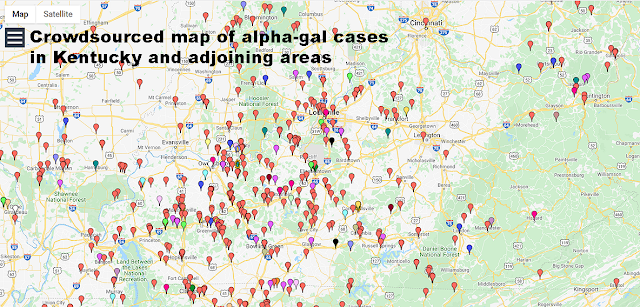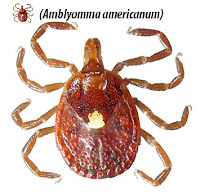Rural weekly reports on increasing tick-borne allergy to red meat

Map shows cases entered by site users and is not verified. For a larger version of the map, click on it.
—–
A tick-borne allergy to red meat is becoming more common, the Adair County Community Voice reported Oct. 31, in a pair of front-page stories: one on the main front and the other leading its occasional Health and Wellness section.
The allergy is caused by a sugar molecule called alpha-gal. Anna Buckman writes, “Dr. Kourtney Gentry Gardner, an allergist-immunologist in Bowling Green, diagnoses about five people a month with the alpha-gal allergy, and it’s becoming increasingly more common, she says.”
 |
| Close-up of the Lone Star tick, which is much larger when it is full of blood. |
People who are bitten by the Lone Star tick, especially those bitten repeatedly, are at risk of “having allergic reactions to the molecule, which is found in most mammalian or red meat,” Buckman notes. “It is relatively new to the allergy world,” having been identified in scientific literature only 10 years ago.
Buckman deals with the science but brings the story home by writing about some local victims, illustrating the varying manifestations of the allergy:
“Tiffany Bean can no longer hang out at summer gatherings where friends grill burgers because, following a tick bite, she developed a food allergy so severe that she even has reaction being around the fumes of cooked beef. . . . Rick Wilson is also allergic to red meat but can eat dairy products. He only had occasional reactions when he was still consuming red meat.”
 |
| Joshua Wethington (Adair Co. Community Voice photo) |
Other differences: “Bean went from just having an itchy tick bite to having a stomach illness for hours or breaking out into a rash if she consumed anything with alpha-gal. She has lost 40 pounds due to the allergy,” Buckman reports. “Joshua got hives all over his body every day that he consumed red meat. Wilson experienced severe itching and nearly passed out during one of his few reactions. Speak to three people with alpha-gal and you’ll discover one thing is certain: it’s complicated. The only similar experiences that Bean, Wilson and the Wethingtons have are the difficulty of living with the allergy and dealing with its affects when they go out publicly.”
Bean told Buckman, “People don’t seem to take it seriously. You tell people that you have it and that you could die from it, and people are like, ‘Oh no, you can’t die from eating a hamburger or bacon.’ Well, yeah, you can.”
Alpha-gal victims use technology to help each other, including a smartphone app (“Is it Vegan?”), a Facebook groups (“The AlphaGal Kitchen” and “Alpha-Gal Support Kentucky”) and an interactive map that locates cases (above).
“Recommended by a member on a Facebook support group, the Munfordville Pool Hall and Grill is a relief to alpha-gal sufferers and also sets a great example for other restaurants for being allergy-friendly in general,” Buckman writes. “The pool hall has designated one fryer where no red meat or cheese is prepared. They have designated skillets to cook foods for separate consumption because people with alpha-gal allergy can have a negative reaction from even the residue from a mammal product.
Pool-hall employee Justin Minton told Buckman that employees acted after notiing that several people in the community have the allergy. “Speaking from experience, going to Subway is pretty much the only place my grandpa can go,” Minton told Buckman.
Even though “people with alpha-gal are helping one another with useful information, Kandace Webster, an advance-practice registered nurse at T.J. Health Columbia Primary Care, “urges sufferers to seek professional guidance,” Buckman reports.